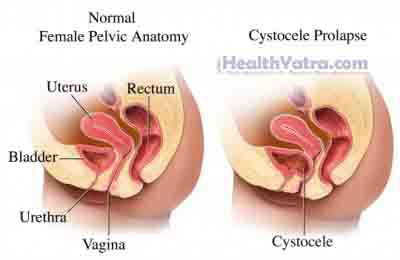Definition
A cystocele occurs when part of the bladder wall bulges into the vagina. The bulge happens through a defect in the wall between the bladder and vagina.

A rectocele occurs when part of the wall of the rectum bulges into the vagina. The bulge happens through a defect in the wall between the rectum and vagina.

These form because of a problem with the fascia, ligaments, and muscles of the pelvis.
Reasons for Procedure
Cystocele and rectocele can cause problems going to the bathroom, urine leakage, or pain during sex. This surgery is done to help relieve these symptoms.
Most often, this type of surgery is not done until all other treatments have been tried. Other treatments may include muscle exercises and the insertion of a pessary device (a supportive ring). If you have tried these treatments and have had no relief, your doctor may suggest surgical repair.
Possible Complications
Complications are rare, but no procedure is completely free of risk. If you are planning to have this type of repair, your doctor will review a list of possible complications, which may include:
- Adverse reaction to anesthesia
- Infection
- Bleeding
- Accidental damage to vagina, rectum, and bladder
- Accidental damage to nearby organs
Factors that may increase the risk of complications include:
- Smoking
- Previous pelvic surgery
What to Expect
Prior to Procedure
- Talk to your doctor about your current medicines. Certain medicines may need to be stopped before the procedure, such as:
- Aspirin or other anti-inflammatory drugs for up to one week before surgery
- Blood-thinning drugs like clopidogrel (Plavix) or warfarin (Coumadin)
- Eat a light meal the evening before the surgery.
- Do not have anything to eat or drink after midnight on the night before the procedure.
- If you are having a rectocele repair, you may need to have an enema the night before the surgery.
Anesthesia
You will often have your choice of either general or regional anesthesia. With general anesthesia, you will be asleep. Regional anesthesia will numb your lower body, but you will be awake.
Description of the Procedure
You may be given an antibiotic just before surgery. A bladder catheter will be inserted in the urethra. This will allow urine to drain and decrease pressure on the bladder.
A cut will be made in the skin to expose the involved muscle and tissue. In some cases, the muscles and tissue will be sewn back onto itself. This will make it stronger. In other cases, a mesh-type material will be used to strengthen the tissue. Any tissue that has been weakened by previous surgeries, pregnancies, or age will be removed. Excess vaginal lining will be removed as well.
In some cases, a suspension or elevation procedure may be done. These are special sutures that provide extra support to the bladder.
How Long Will It Take?
45 minutes to two or more hours
How Much Will It Hurt?
You will likely experience vaginal discomfort for 1-2 weeks following the surgery. You will be given medicine to help relieve this.
Average Hospital Stay
The usual length of stay is 1-2 days. Your doctor may choose to keep you longer if complications arise.
Post-procedure Care
At the Hospital
- A medicated vaginal packing is usually left in the vagina overnight.
- If you had a rectocele repair, the bladder catheter will be removed as soon as you are able to use the restroom on your own.
- If you had a cystocele repair, the bladder catheter often needs to stay in longer (sometimes 2-6 days). This will allow the bladder more time to begin to work normally.
- You may notice a smelly, even bloody, discharge from the vagina for 1-2 weeks.
At Home
When you return home, do the following to help ensure a smooth recovery:
- Avoid lifting anything that weighs more than 10 pounds for about six weeks.
- Avoid sexual intercourse for about six weeks.
- Avoid inserting anything into the vagina (such as, tampons) for about six weeks.
- Have someone to help you at home for a few days following the surgery.
- Drink plenty of fluids and eat a healthy, high fiber diet to keep stools soft.
- Ask your doctor about when it is safe to shower, bathe, or soak in water.
- Be sure to follow your doctor’s instructions.
Call Your Doctor
After you leave the hospital, contact your doctor if any of the following occur:
- Signs of infection, including fever and chills
- Excessive bleeding, or any discharge from the incision site
- Unusually heavy vaginal bleeding, or foul-smelling discharge from the vagina
- Nausea or vomiting
- Pain that you cannot control with the medicines you have been given
- Inability to pass urine into catheter
- Pain, burning, urgency or frequency of urination, or persistent blood in the urine
- Cough, shortness of breath, or chest pain
In case of an emergency, call for medical help right away.
